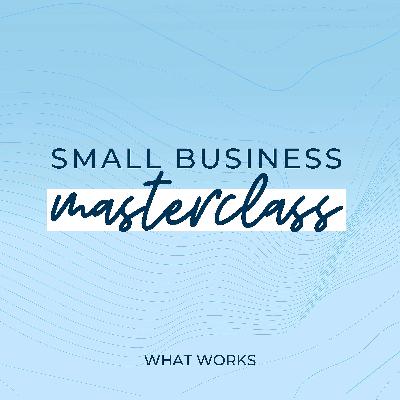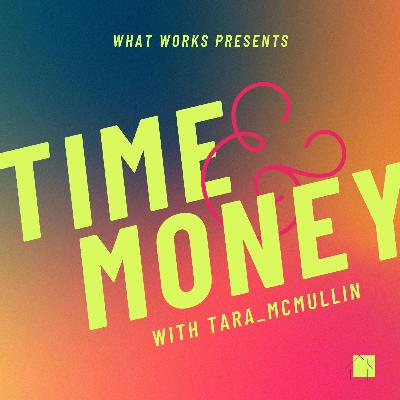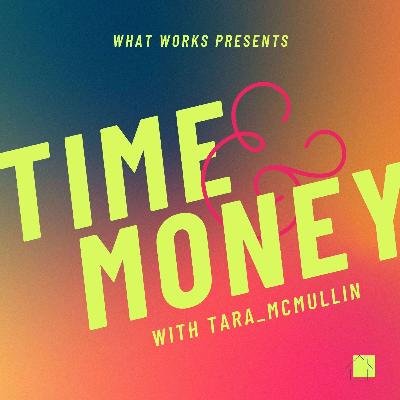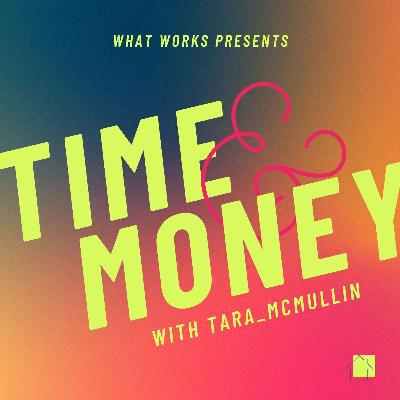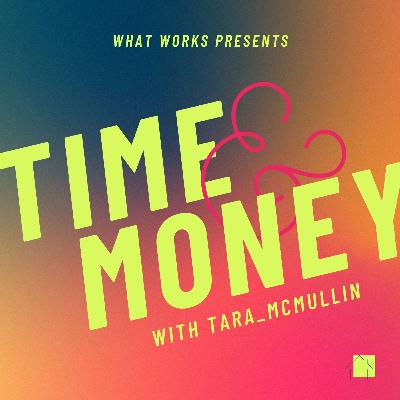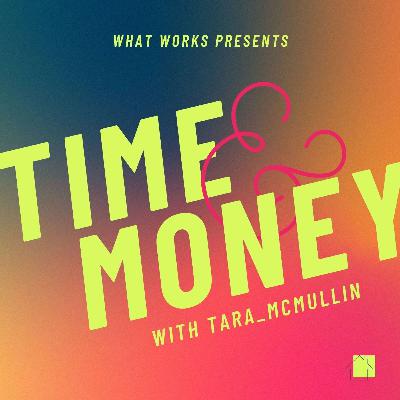Discover Time & Money
Time & Money

Time & Money
Author: Tara McMullin
Subscribed: 4Played: 25Subscribe
Share
© 2022 What Works
Description
Ben Franklin penned the phrase "time is money" back in the 18th century. Three hundred years later, we take it for granted. But the idea that time is money has had a massive impact on the way we work and earn our livelihoods today. Time & Money is an 8-part limited series designed to help you question your assumptions about time, money, and their intersection. What is money? How much is our time work? How do we measure quality time? And what metrics really matter when it comes to how we understand our time and our money? Time & Money is a special presentation of What Works, hosted by Tara McMullin, and YellowHouse.Media. You'll hear from experts like Paco de Leon, founder of Hell Yeah Bookkeeping, money coach Keina Newell, business operations specialist Elisabeth Jackson, and American in Paris Anne Ditmeyer. We'll dive into the history of work, consult philosophy, explore social and political theory, and ask: is time really money?
11 Episodes
Reverse
We always want the things we can't have, right? And right now, that includes happy hours, team meetings, retreats, conferences, and even coffee dates.Luckily, we've got the tech to recreate these experiences online. But, as anyone who's sat through a neverending online meeting knows, there's more to it than firing up a digital conference room.It is possible to engineer meaningful and valuable events online--but you have to have a plan and a strategy.Small Business Masterclass is all about sharing the ideas and skills that will help you navigate a changing economy as a small business owner. Each masterclass is recorded live in front of a virtual audience--especially apropos for today's topic. Check out the show notes for links to items that we mention during the session, as well as the agenda & notes.Small Business Masterclass is a joint production of What Works and YellowHouse.Media. For more support on navigating the changing economy as a small business owner, go to explorewhatworks.com/network and become a member of our online small business community!Today's masterclass is all about hosting dynamic events online. Whether you're looking to recreate an in-person conference experience in a digital environment or get creative with ways to bring people together for the first time, this masterclass will guide you through creating the purpose, structure, schedule, and technology set up that will work best for your event. You'll also learn about the role you play in an event, how to keep from overwhelming your audience with too much information, and why there's no such thing as too much communication around your event.Important Links:
Today's outline & notes
Tune in for future live masterclasses
The What Works Network
YellowHouse.Media
Standout Podcast Club
Online Event Tools:
We use Crowdcast (affiliate link) for large events (25+ people) and use the chat & question features to get audience members talking to each other
We use Zoom for smaller events (25 or fewer people) and often use breakout rooms to encourage participation and give everyone the chance to talk
We have a community on a Mighty Network (affiliate link) that gives us a chance to communicate between live sessions
We often put together an agenda in a Notes app or Notion and screen share that agenda so that people can see where we’re at. For larger, more planned events, we use a slide deck to reinforce structure and instructions
We're going to be user Voxer to create more intimate asynchronous communication during a virtual retreat we're hosting next week'
I love the book The Art of Gathering (affiliate link)— and, even though it’s geared to in-person events, it would be an incredible resource for thinking through truly incredible virtual events
Producing a podcast for your business is a fantastic way to connect with potential buyers, elevate your brand, and grow your business.A great podcast can quickly create a close, trusted relationship between you and your listener--and that's the perfect position to be in when you have an offer to market and sell.But if your show is just another one of the thousands your right people could listen to, you're not going to get very far.The "secret" to making a show that can actually help you grow your business is to make a standout podcast—a show that rises above the noise, gets people's attention, and keeps them listening.I'm Tara McMullin and this is Small Business Masterclass. Small Business Masterclass is all about sharing the ideas & skills that will help you navigate a changing economy as a small business owner. Each masterclass is recorded live in front of a virtual audience. Check out the show notes for links to items that we mentioned during the session, as well as the agenda and notes. Small Business Masterclass is a joint production of What Works and Yellow House Media.At What Works, we've produced over 270 episodes of our show, a small business podcast that stands out with candid conversations, often overlooked topics, and diverse guests.Now, our sister company, Yellow House Media, produces standout podcasts for other small businesses too. In today's masterclass, I'll be sharing my top tips & learnings about producing a standout podcast and answer top questions about what it takes to produce a quality show that gets results for your small business.Now, if you're looking to level up the podcast you already produce or launch a new standout podcast to support your business, we'd love to help. Standout Podcast Club is a small group coaching program that will guide you through upleveling or launching a podcast that makes your business money.Links:
Notes & resources
YellowHouse.Media
What Works Podcast
Standout Podcast Club
Break The Ceiling podcast
Tools We Use:
Notion - We use Notion to create editorial calendars, track launch project progress, share information between team members, and generally make ourselves more productive and effective as producers. This tool has been life-changing and we can't recommend it highly enough.
Descript - We use Descript to transcribe episodes in their raw form, make content edits, and script intros and outros. This tool has dramatically reduced the time it takes us to make an episode better because we it allows us to edit audio like it's a word processing document.
Squadcast - We use Squadcast to record remote interviews. Squadcast makes a better recording than Zoom or Skype, plus it avoids connectivity issues by recording locally in your guest's browser cache. It's an easy way to really up your production value if you have an interview show.
Canva - We use Canva to create graphic templates for pull quotes and audiograms, as well as cover art for several of our shows. Canva makes handing off simple design jobs to team members a breeze. As people who know how to use the "fancy" graphics tools, Canva is still our top choice from a productivity and consistency standpoint.
Google Drive - We use Google Drive to create an archive of our templates, procedures, scripts, episodes, etc... It's still the most accessible and cheapest tool there is for this purpose.
Blubrry - Our preferred podcast host is Blubrry. We love the support Blubrry provides for Wordpress-powered websites. (We're hosting Small Business Masterclass on Transistor.fm and give this platform an enthusiastic thumbs up, too!)
Headliner - We use Headliner to create audiograms (videos that use snippets of audio for sharing on social media) for each episode we produce. This tool is easy-to-use and really powerful. Try Headliner Pro free to two weeks using this link.
Audacity - We actually use a few audio editors in the course of putting together an episode. But the main one our editor uses is Audacity—which is available for both Mac and PC.
“Time is money.” It’s a phrase we take for granted in the 21st century. Every hour of the day is a potentially monetizable unit. It’s another client you can serve, another social media post you can create, another trip you can drive, invoice you can send, or errand you can run.Ben Franklin penned the phrase “time is money” back in the 18th century. It’s a sort of semiotic turning point from the piety of vocation—the heart of the Protestant work ethic—to the pragmatic striving of industrialized capitalism. Both time and money seem predetermined and standardized. A dollar is a dollar. An hour is an hour. But they’re modern inventions. And their standardization defies our lived experience. A dollar can have considerably different value depending on your circumstances or the transaction you want to make. An hour can seem like an interminably long time when you’re in labor or feel like an instant when you’re engaged in an activity you love.Our livelihoods revolve around time and money. The way we navigate the world and even relate to others is influenced by our access to time and money. So how we think about time, money, and how they intersect has an immense influence on our lives.Welcome to Time & Money—a special presentation of What Works. I’m your host, Tara McMullin. In this 8-part limited series, I take on critical questions about our relationship to time and money. I talk with experts, dive into the history of work, consult philosophy, and explore social and political theory. It’s a multidisciplinary journey designed to help you question your assumptions about resources we often take for granted.All 8 episodes are available now with links to each episode in essay form in the show notes.If Time & Money helps you think about, well, time & money in new ways, share the series with a friend. And check out What Works on your favorite podcast player for more insights into navigating the 21st-century economy with your humanity intact.
★ Support this podcast ★
“Time is money.” Ben Franklin gave us that chestnut in 1748—and ever since, we’ve been trained to think of our lives as opportunities for making a buck. This week, we start a series exploring the “time is money” construction. But before we think through how we spend our time, we’re going to think through money: what it really is, how we relate to it, and some of the factors that make it “weird.” I talk with Paco de Leon from the Hell Yeah Group and the author of the brand-new book, Finance For The People.Resources:Finance For The People, by Paco de LeonThe Hell Yeah GroupThe NerdletterThis episode is also available in essay form.
★ Support this podcast ★
We spend money on lots of tools designed to save us time and work. But all too often, those tools just end up raising our expectations. Why do work in less time when you could do more work in the same amount of time?! In this episode, I examine “the egg beater effect” and why we should, just maybe, lower our expectations a bit.Resources:You’re Wrong About: The Stepford WivesMore Work For Mother by Ruth Schwartz CowanEpisode 371: What is the creator economy? with Gina BianchiniEpisode 364: The Abundant Value Of Virtual Assistants with Janice Plado DalagerEconomic Possibilities For Our Grandchildren by John Maynard Keynes This episode is also available in essay form.
★ Support this podcast ★
There’s more than one way to measure success—and there’s more than one way to measure time. How do you account for the time you spend working? And is it really the most effective—for you—to spend it? In other words, what constitutes quality time when it comes to the way you work? I talked with business operations coach Elisabeth Jackson about how she changed her overwork habit, how she measures quality time for herself & her clients, and why she doesn’t love the word “productivity.”Resources:Find out more about Elisabeth JacksonMore about Frederick Winslow TaylorLost In Work, by Amelia HorganEP 373: The Eggbeater Effect, listen or readThis episode is also available in essay form.
★ Support this podcast ★
I’ve been talking about the “new economy” since about 2010. But more and more, I recognize that the economic possibilities created through the internet aren’t nearly as new or innovative as I’d first thought (and hoped). It seems that the old economy is just making itself over as the not-so-new economy. In this episode, I explore 3 processes of the old economy—speculation, financialization, and liquidation—to pinpoint how they’re showing up in our digital world of independent work.I weave together the housing market, creator economy, Great Recession, and crypto promises to help you situate yourself in this strange, not-so-new world. At times, it’s a bleak story—but ultimately, understanding where we’re at gives us a better opportunity to make different, more humane choices.Resources:CNBC Interview with NewNew Founder Courtne SmithInvestopedia on financializationThe Big Short by Michael LewisMichael Lewis on 60 Minutes“How the financial crisis changed jobs” from MarketplaceGig Economy explainer via MarketplaceNFTs explainer via Marketplace“How Money Became The Measure Of Everything” by Eli Cook“The complicated reality of doing what you love” by Marian BullGreater Fool Theory on Investopedia“I crowdfunded a novel using cryptocurrency” by Elle GriffinThis episode is also available in essay form.
★ Support this podcast ★
Most of us learn the value of our time in our first jobs. Even as we get more experience and our hourly jobs turn into salaried jobs or freelance projects, the specter of selling your time for a particular wage looms. In this episode, I talk with Wealth Over Now founder & Money Files host Keina Newell about how she thinks about the intersection of time and money. I also offer up a light history of wage work and how that history influences business owners.Resources:Wealth Over Now — Keina NewellMoney Files — Keina’s podcastWhat is the domestic system?What is the Fair Labor Standards Act?Further reference: Labor writers Kim Kelly & Sarah Jaffe in conversationEP 341: Taking Better Care Of Each Other with Kate StrathmannGames Against Humanity: C Thi Nguyen on the Conspirituality podcastThis episode is also available in essay form.
★ Support this podcast ★
The systems we operate in all have different incentive systems: our business models, the social media platforms, our economy, the culture at large… And many of these incentive systems have become simplified and gamified—changing the way we view the results of our work and the goals that we hold. In this episode, I explore how the philosophy of games can help us identify when we’re just trying to “game the system” instead of taking effective action based on our own values and goals.Resources:C. Thi Nguyen at the Royal Institute of PhilosophyNguyen on The Ezra Klein ShowHow Twitter Gamifies CommunicationWhat Tech Calls Thinking by Adrian DaubGames: Agency As Art by C. Thi NguyenThis episode is also available in essay form.
★ Support this podcast ★
A lot of the work we do today doesn’t much look like “work.” The divide between work-life and life-life is flexible and porous. So what does that mean for the way we spend our time? Or how we earn a living? In this episode, I share designer, coach, and consultant Anne Ditmeyer’s story of rethinking how she works thanks to a big move to Paris. And, I argue that perhaps we need a radically different way of thinking about what work is—instead of a better “work-life balance.”Resources:Learn more about Anne DitmeyerLost In Work, by Amelia HorganEpisode 349 with Brittany BergerThis episode is also available in essay form.
★ Support this podcast ★
In the final episode of Time & Money: why we choose to squeeze more in over taking time off. I share how The Squeeze works, why work gets more intense over time, and some of the economic incentives that keep us from making different choices.Resources:“Feeling The Squeeze? Why Your Business Feels So Tight” by Tara McMullin“Busy vs Squeezed: How To Tell The Difference & Why It Matters” by Tara McMullin“Economic Possibilities For Our Grandchildren” by John Maynard KeynesCapitalist Realism by Mark FisherProtestant Ethic & The Spirit Of Capitalism by Max Weber“When Time Is Money: Contested Rationalities of Time and Challenges to the Theory and Practice of Work” by Barbara AdamCan’t Even by Anne Helen PetersenWintering by Katherine MayThis episode is also available in essay form.
★ Support this podcast ★


